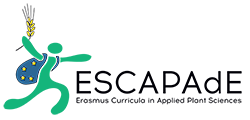English title:
GPS-based agriculture
Course ID:
931314
ECTS credits:
3,0
Title in native language:
GPS-gestützte Landwirtschaft
GPS-gestützte Landwirtschaft
Term Semester:
Spring/Summer
Instruction language(s):
German
Course content:
The course is divided into a theoretical part and an application part.
In the theoretical part the technology of Global Navigation Satellite Systems (GNSS) is discussed. The structure and the functionality, the methods of positioning and navigation, the sources of error and achievable quality of positioning as well as the relationship of the different coordinate systems are explained. The different instrument classes and the planning of a GPS survey are also discussed.
The application part deals with the use of GNSS technology in agriculture (keyword: "precision agriculture"). Sensor technology, application strategies, and their benefits are addressed. Topics such as site-specific farming, yield mapping, automatic guidance systems will be covered.
Two field trips will take place as part of the course. On the experimental farm in Groß Enzersdort the technology will be presented in practical exercises. Another excursion will lead to a practical farm or to a fair. Due to Covid restrictions the practical part will be replaced by a virtual excursion.
In the theoretical part the technology of Global Navigation Satellite Systems (GNSS) is discussed. The structure and the functionality, the methods of positioning and navigation, the sources of error and achievable quality of positioning as well as the relationship of the different coordinate systems are explained. The different instrument classes and the planning of a GPS survey are also discussed.
The application part deals with the use of GNSS technology in agriculture (keyword: "precision agriculture"). Sensor technology, application strategies, and their benefits are addressed. Topics such as site-specific farming, yield mapping, automatic guidance systems will be covered.
Two field trips will take place as part of the course. On the experimental farm in Groß Enzersdort the technology will be presented in practical exercises. Another excursion will lead to a practical farm or to a fair. Due to Covid restrictions the practical part will be replaced by a virtual excursion.
Learning outcomes:
After successful completion of the course, students will be able to:
- describe the basics of satellite-based navigation and positioning
- classify the parameters of influence of environment and technology on accuracy
- demonstrate the application of the technology in agriculture and its benefits
- select the necessary components for implementation
- describe the basics of satellite-based navigation and positioning
- classify the parameters of influence of environment and technology on accuracy
- demonstrate the application of the technology in agriculture and its benefits
- select the necessary components for implementation
Teaching and learning methods:
The course starts with several classroom sessions where the contents are presented. The knowledge gained is to be deepened with equipment tests in Groß Enzersdorf (calibration of sampling points, creation of test plots, lane planning and testing of automatic steering systems). A suitable date for this will be arranged in the first lecture unit. The excursion is intended to extend the knowledge gained by the current state of the art and to demonstrate the various application possibilities close to the equipment.
Another excursion will lead to a practical company or to a fair. The dates will also be arranged in the first lecture.
The practical part will be carried out as a virtual excursion due to Covid restrictions.
Another excursion will lead to a practical company or to a fair. The dates will also be arranged in the first lecture.
The practical part will be carried out as a virtual excursion due to Covid restrictions.
Exam method:
The overall grade results from the following sub-areas:
1. Written examination (80 out of 100 points).
The written examination is divided into a basic part and a part in the field of precision agriculture. Each part will be graded with 40 points.
2. Participation in field trips (5 out of 100 points)
Participation in the excursions is obligatory and counts towards the final grade. If participation is not possible (with appropriate excuses only), a short literature review on a topic in the field of precision agriculture must be written.
3. Protocol of the trial day (15 out of 100 points)
A short protocol with the results is to be written for the field trial day.
Grade key
90 - 100 = very good (1)
78 - 89 = good (2)
66 - 77 = satisfactory (3)
55 - 65 = sufficient (4)
0 - 54 = not sufficient (5)
1. Written examination (80 out of 100 points).
The written examination is divided into a basic part and a part in the field of precision agriculture. Each part will be graded with 40 points.
2. Participation in field trips (5 out of 100 points)
Participation in the excursions is obligatory and counts towards the final grade. If participation is not possible (with appropriate excuses only), a short literature review on a topic in the field of precision agriculture must be written.
3. Protocol of the trial day (15 out of 100 points)
A short protocol with the results is to be written for the field trial day.
Grade key
90 - 100 = very good (1)
78 - 89 = good (2)
66 - 77 = satisfactory (3)
55 - 65 = sufficient (4)
0 - 54 = not sufficient (5)
Organisation: University of Natural Resources and Life Sciences Vienna
Country:
Austria
Acronym:
BOKU
ERASMUS+ code:
A WIEN03
Teaching period summer semester:
22. Feb 2021 - 30. Sep 2021
Teaching period winter semester:
13. Oct 2020 - 21. Feb 2021
University website:
